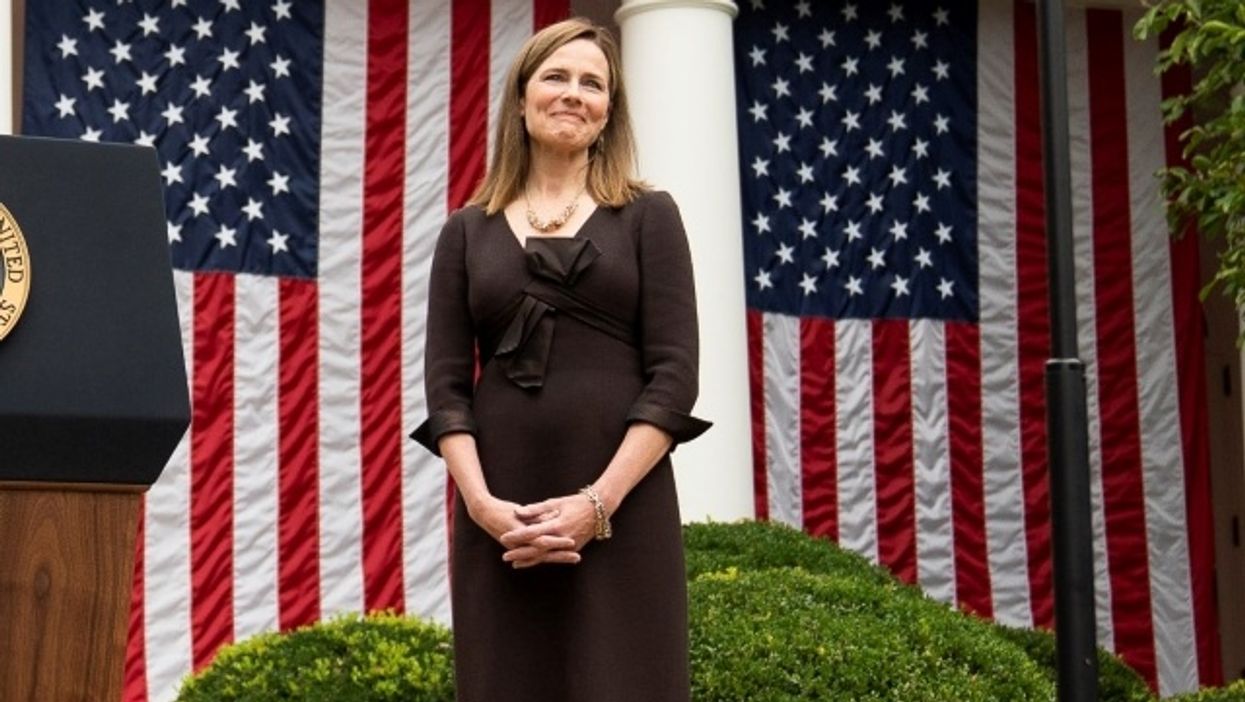
Amy Coney Barrett
Only 42 percent of Americans believe the Senate should confirm Amy Coney Barrett to the Supreme Court, according to the results of a CNN poll conducted Oct. 1-4 and released Wednesday. This puts her about even with Justice Brett Kavanaugh for the lowest level of initial support for any nominee since 1987.
The poll found that 46 percent of Americans say the Senate should not approve Trump's pick for a lifetime appointment, putting her at a net negative four percent. Initial polls found Kavanaugh at a net negative three percent or four percent — the worst numbers of any nominee since Ronald Reagan unsuccessfully tried to put Robert Bork on the high court.
In September 1987, the New York Times noted that Bork's nomination to the Supreme Court was supported by 14 percent of Americans, while 13 percent opposed it and 66 percent were unable to say.
CNN's survey also found that 56 percent of those polled believe Barrett should recuse herself from any cases related to the 2020 presidential election, compared to just 34 percent who disagreed. In her answers on a Senate Judiciary Committee questionnaire last week, she omitted the election from a list of topics from which she promised to recuse herself if confirmed.
The poll is in line with others that found most Americans believe the nominee for the Supreme Court seat left vacant by the death of Justice Ruth Bader Ginsburg should be chosen by whoever wins the presidential election in November.
Setting a new precedent, Senate Republicans in 2016 refused to hold hearings for more than a year for Merrick Garland, President Barack Obama's nominee for the seat left open by the death of Justice Antonin Scalia in February of that year, arguing that letting the president fill an open seat on the court in an election year was somehow depriving the American people of a say in the process. The seat remained open until it was filled after Donald Trump entered the White House.
Now Republicans claim that there is no contradiction in racing to push through Trump's nominee with less than 30 days until the election.
Prior to her death last month, Ginsburg told family that it was her "most fervent wish" that her successor be named by the next president. Trump has falsely claimed that Democratic leaders made up that last wish and has rushed to confirm her replacement before the election.
Barrett's record may also be a factor in her unpopularity. She has been a judge for less than three years; prior to that she was a Notre Dame Law School professor. She helped the Alliance Defending Freedom (designated by the Southern Poverty Law Center as anti-LGBTQ hate group) train conservative lawyers and signed on to an anti-abortion rights group's ad opposing the decision in Roe v. Wade as "barbaric."
Senate Democrats have expressed concern that she omitted her anti-abortion activism when she submitted required materials to the Judiciary Committee.
"The failure to disclose the 2006 letter leads to additional questions about other potentially missing materials," the committee's Democratic minority said in a letter to Assistant Attorney General Beth Williams released Tuesday. "The omission also raises concerns that the process of collecting materials responsive to the [Senate Judiciary Committee questionnaire], like the nomination process itself, has been rushed, for no legitimate reason."
Published with permission of The American Independent Foundation.
- Feingold Warns Against Rush To Ram Through Barrett Nomination ... ›
- Trump Court Nominee Would Jail Doctors Who Provide ... ›
- Trump Chooses Far-Right Judge Barrett For Ginsburg Seat ... ›
- Hashtag 'Superspreader' Pinned To Trump's Reckless Supreme ... ›
- Watch: Barrett Deflects Questions On Roe, Despite Publicly Urging Its Reversal - National Memo ›








